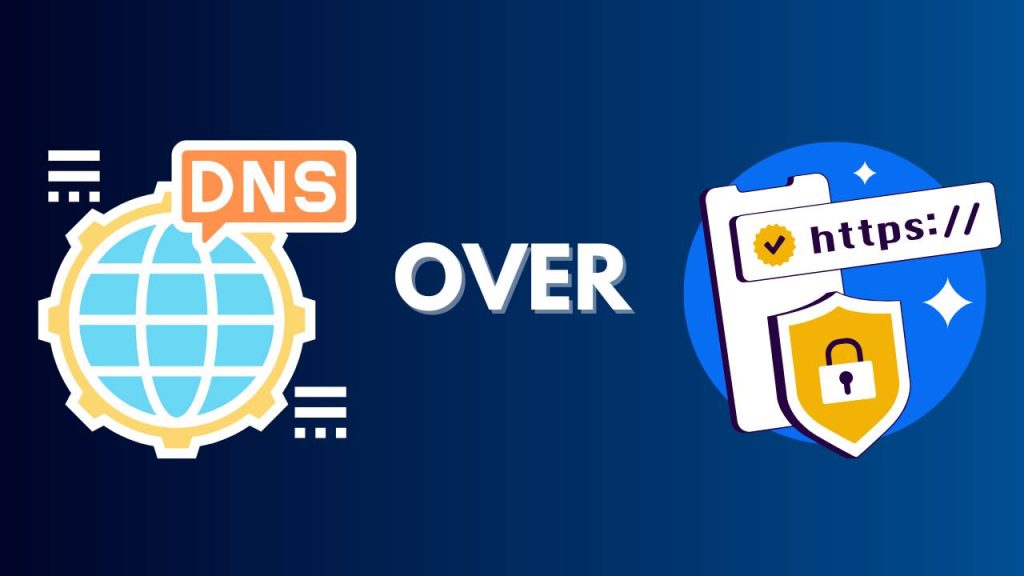In the digital age, where nearly every action we take involves the internet—whether browsing, banking, or simply watching videos—privacy and security have become more crucial than ever. One emerging technology that aims to protect internet users from surveillance, DNS spoofing, and censorship is DNS over HTTPS (often abbreviated as DoH).
How to Get HTTPS for Website – Free & Paid Options Explained
DNS over HTTPS is more than just another acronym—it represents a significant shift in how your device communicates with the internet. If looking to better understand your online privacy and take control of your browsing habits, this guide will walk you through what DNS over HTTPS is, its real-world advantages, potential drawbacks, and how to enable it on your devices.
Understanding DNS and Why It Matters
Before we dive into DoH, it’s essential to understand how the Domain Name System (DNS) works. Think of DNS as the internet’s directory assistance. It helps translate human-readable web addresses (like www.google.com) into machine-readable IP addresses (like 142.250.190.78), which are used to route your request to the correct server.
Whenever you visit a website, your browser sends a DNS query to a DNS resolver to find the correct IP address. Traditional DNS requests are sent in plain text, without encryption. This means third parties—like your internet service provider (ISP), network administrators, or even hackers on public Wi-Fi—can intercept and view your browsing habits.
This visibility makes DNS a major target for surveillance and censorship. Fortunately, DNS over HTTPS is designed to address these vulnerabilities.
What Is DNS over HTTPS (DoH)?
DNS over HTTPS is a modern internet protocol that encrypts DNS requests by sending them over the same secure HTTPS protocol used to access websites. Instead of sending your DNS queries in plain text over port 53 (like traditional DNS), DoH sends them encrypted via port 443, which is the same port used for regular secure websites.
This process effectively hides your DNS requests inside the encrypted traffic your browser already uses, preventing others on the network from monitoring or manipulating them. With DoH, only you and your chosen DNS provider can see the websites you request—no one in between.
This is a game-changer for internet privacy, especially in countries or networks where DNS-level censorship or surveillance is prevalent. It’s also beneficial for users on public Wi-Fi networks, where unencrypted DNS requests are often exploited.
Benefits of DNS over HTTPS
1. Improved Privacy for Users
One of the most significant advantages of using dns over https is enhanced privacy. With traditional DNS, your browsing habits are visible to your ISP, governments, and potential eavesdroppers. Even if the websites you visit use HTTPS, your DNS queries remain exposed.
By encrypting these requests, DoH ensures that third parties can no longer track your internet activity at the DNS level, protecting your search queries, website visits, and even the services your apps use. This added layer of privacy is especially important for journalists, activists, or users living under restrictive regimes.
2. Defense Against DNS Hijacking and Spoofing
DNS hijacking is a common cyberattack in which hackers intercept and alter DNS queries, redirecting users to malicious or fake websites without their knowledge. This technique is often used in phishing attacks, malware infections, or surveillance.
With dns over https, your DNS requests are securely encrypted and authenticated, which prevents unauthorized modifications in transit. This reduces the risk of visiting a fraudulent or compromised site and ensures that the IP address you receive is legitimate and trustworthy.
3. Helps Bypass Internet Censorship
In many countries or organizations, website access is restricted by intercepting DNS queries and filtering them based on content. DNS over HTTPS can help users circumvent censorship mechanisms by preventing these intermediaries from identifying which websites are being requested.
Because DoH queries look like standard HTTPS traffic, they cannot be easily distinguished or blocked without completely disabling access to all HTTPS websites, making it a powerful tool for accessing blocked content while maintaining secure connections.
4. Enhanced Security on Public Wi-Fi and Shared Networks
Public Wi-Fi hotspots—like those in airports, cafes, and hotels—are prime targets for attackers who monitor network traffic to steal data. These networks are often unsecured and can expose your DNS traffic to other users on the same network.
By encrypting your DNS traffic, dns over https protects you from these types of attacks. Even if someone is monitoring the network, they won’t be able to see the domains you’re accessing or redirect you to malicious sites. This significantly reduces your risk when using open networks.
5. Built-in Support in Major Browsers and Operating Systems
Another benefit of DNS over HTTPS is that it’s becoming widely supported and easy to enable. Modern browsers such as Mozilla Firefox, Google Chrome, and Microsoft Edge have built-in settings for DoH, allowing users to enable it with just a few clicks.
Moreover, operating systems like Windows 10/11, Android, and iOS now offer native or app-based support for DoH. This means users can protect their entire device, not just their browser traffic, enhancing the effectiveness of the protocol across all internet-connected apps.
Risks and Concerns of DNS over HTTPS
1. Centralization of DNS Traffic to Major Providers
While DNS over HTTPS enhances privacy, it can also lead to the centralization of DNS services. Many users will rely on DoH servers provided by large tech companies like Google, Cloudflare, or Microsoft, concentrating a vast amount of internet traffic under a few entities.
This centralization could raise privacy and trust concerns. If everyone uses the same DNS provider, that provider gains significant insight into user behavior. Therefore, users must carefully choose trustworthy DNS providers that commit to data minimization and transparent privacy policies.
2. Disruption of Network-Level Monitoring and Controls
Network administrators often use DNS logs to filter content, detect malware, or enforce security policies in environments like schools, offices, and homes. When devices bypass the local DNS servers by using DoH, these tools lose visibility into DNS traffic.
This can make it difficult to block inappropriate content, track security breaches, or diagnose connectivity issues. Some administrators may need to implement special configurations or restrict DoH usage entirely within their managed networks.
3. Can Be Exploited by Malware or Bad Actors
Ironically, while dns over https can protect users, it can also protect cybercriminals. Malware developers may use DoH to hide their command-and-control traffic, making it harder for security software to detect DNS-based communication.
In traditional DNS setups, abnormal queries can be logged and flagged. But with encrypted DNS traffic, malicious software can operate covertly, unless additional monitoring systems are in place. This tradeoff between privacy and transparency needs to be balanced carefully in secure environments.
4. Compatibility Issues with Legacy Devices and Systems
Not all operating systems and applications support DoH out of the box. In older networks, enabling DoH may result in DNS resolution errors, mismatched policies, or inconsistent behavior among devices.
For example, smart home devices or embedded systems may continue to use traditional DNS, creating a mixed traffic environment that could complicate troubleshooting. Users and administrators must ensure that their systems are compatible before enforcing DoH organization-wide.
How to Enable DNS over HTTPS (DoH)
Enabling DoH is relatively simple and varies slightly depending on the device or browser. Below is a step-by-step guide to enable DNS over HTTPS across popular platforms:
1. Enable DoH in Firefox
- Open Firefox Settings.
- Navigate to Privacy & Security > DNS over HTTPS.
- Tick the checkbox to Enable DNS over HTTPS.
- Choose a provider like Cloudflare or NextDNS, or enter a custom one.
- Firefox will now route all DNS queries securely, offering protection for all browsing sessions.
2. Enable DoH in Google Chrome
- Go to Settings > Privacy and Security > Security.
- Scroll to Advanced, then turn on Use Secure DNS.
- Select a DNS provider or enter a custom DoH URL.
- Chrome will now perform DNS queries over HTTPS, shielding your browsing history from prying eyes.
3. Enable DoH in Windows 10/11
- Go to Settings > Network & Internet > Ethernet or Wi-Fi > Hardware Properties.
- Scroll to DNS Settings > Edit.
- Choose Manual, then switch IPv4/IPv6 to On.
- Enter DoH-compatible DNS addresses (e.g., Cloudflare: 1.1.1.1, Google: 8.8.8.8).
- Save changes. Your PC will now send encrypted DNS queries, enhancing system-wide security.
4. Enable DoH on Android (9 and Above)
- Navigate to Settings > Network & Internet > Advanced > Private DNS.
- Choose “Private DNS provider hostname”.
- Input a hostname such as dns.google or dns.cloudflare-dns.com.
- Once saved, all DNS queries from your Android device will be encrypted via HTTPS.
5. Enable DoH on iOS (13 and Up)
- Download a DoH-enabled DNS app like Cloudflare’s 1.1.1.1 from the App Store.
- Open the app and toggle the DNS protection switch.
- The app installs a secure DNS profile and routes queries through a DoH server.
- iOS will now resolve domains securely, helping protect your online activity.
FAQs
1. What is DNS over HTTPS (DoH)?
DNS over HTTPS is a security protocol that encrypts DNS queries using HTTPS, preventing third parties from seeing which websites you visit.
2. How is DNS over HTTPS different from traditional DNS?
Traditional DNS sends queries in plain text, making them visible to ISPs and others. DoH encrypts these queries, securing them from interception or tampering.
3. Does DNS over HTTPS protect my entire internet activity?
No. DoH only encrypts DNS queries. It doesn’t hide your IP address or encrypt the full internet connection like a VPN does.
4. Can DNS over HTTPS be used with a VPN?
Yes, and using both together enhances privacy. A VPN encrypts all traffic, while DoH specifically secures DNS lookups.
5. Which browsers support DNS over HTTPS?
Browsers like Mozilla Firefox, Google Chrome, Microsoft Edge, and Brave offer built-in support for DoH with easy setup options.
6. Is DNS over HTTPS available on mobile devices?
Yes. Android (9 and above) and iOS (13 and above) support DoH either natively or through third-party apps like Cloudflare’s 1.1.1.1.
7. Are there any risks in using DNS over HTTPS?
While DoH improves privacy, it can hinder network-based monitoring, centralize traffic to few providers, and be misused by malware.
8. How do I choose a DNS over HTTPS provider?
Select a trusted provider like Cloudflare, Google, Quad9, or NextDNS—preferably one with clear privacy policies and minimal logging.
9. Will using DNS over HTTPS slow down my internet?
Generally, no. In many cases, DoH can slightly improve speed by using fast DNS resolvers, though results may vary by provider.
10. How can I enable DNS over HTTPS on my system?
You can enable it through your browser settings, operating system network settings, or by using a DNS app on mobile devices.






